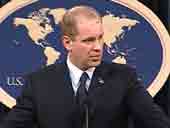The world going one way, Russia the other
By David Matsaberidze
Friday, September 12

Russia is still violating the six point agreement, mainly under the pretext of security, and is still pushing for the deployment of its military units in and beyond the conflict zones. The West is arguing for full implementation of the ceasefire agreement, and will only agree to allow Russian forces to be in the conflict regions under the monitoring-observance of EU special forces, a detachment of which, according to the EU’s Javier Solana, should arrive in Georgia in October.
The US is concerned that Russia seeks to deploy 7,600 military personnel in Abkhazia and South Ossetia and their hinterlands. As US State Department spokesman Sean McCormack stressed, “it is very alarming that various high-ranking Russians, be it President Medvedev or Minister for Foreign Affairs Sergey Lavrov, continually try to manipulate the agreement in order to leave military personnel on Georgian territory.” Russia is violating the ceasefire and the Russian Government and its military units should obey international norms and agreements, McCormack stated.
The EU Head of Foreign Policy and Security Affairs, Javier Solana, has clearly stated that “by October 10, a month from now, Russian military units should be removed from all territories beyond the conflict zones,” and will stay in Abkhazia and South Ossetia only under the supervision of UN and OSCE monitoring missions. “The status quo should be restored as of August 8,” Solana stressed. Eric Edelman, The US Defence Secretary, urged Russia to re-think its position and warned that the US will respond accordingly to the actions of the Kremlin. “Russian-US relations are in deadlock after the Russian-Georgian War and Russia should think over its future mode of relations with the rest of the world,” Eric Edelman stressed during his speech.
Russia has urged NATO to cancel an official visit to Georgia. The Permanent Representative of Russia to NATO, Dimitry Rogozin, has appealed to member states of the alliance, and its Secretary General Jaap De Hoop Scheffer, to cancel the visit scheduled for September 15-16, terming it as “inappropriate and misplaced after the recent tragic developments in South Ossetia.” Stating that the meeting is seen by Georgia as signifying full scale political and military support from NATO, Rogozin argued that NATO, the OSCE and the EU should impose an embargo on delivering arms and military hardware to Georgia.
Russian Foreign Minister Sergey Lavrov visited Warsaw to discuss his concerns over the location of US Anti-Missile Systems on the territory of Poland. Meetings were held with his Polish counterpart Radek Sikorski and Jaroslaw Kaczynski. Lavrov asked the Polish Government to reverse its decision to allow the missiles to be based there: “This is a mistake, as Poland is not aware of the consequences of making this dangerous move,” Lavrov told journalists. Meanwhile, a special statement was made by the Russian Commander of Strategic Missile Forces, arguing that “Russia could make Poland a target for its missiles.”
Recently some critics of Russian actions have appeared in Russia as well. The former PM of the Russian Federation, Mikheil Kasianov, blamed Moscow for the provocation of the conflict in Georgia. “Russia used all measures and tools to inflame the conflict and launched a full scale war after provoking Georgia. Russia’s actions went beyond its peacekeeping mission and were transformed into full scale war against Georgia,” Kasianov remarked. “Russia is devastated by the reaction of the civilized world, and being afraid of international isolation starts to send warning messages to the world. Although manipulating the West with gas and oil, the Kremlin is afraid, being aware that Soviet style methods are no longer applicable to the modern world,” Kasianov stated.
Georgia is still sending special missions and appeals to various international organizations. Parliament Speaker Davit Bakradze has taken part in debates on the theme “Russia-Georgia – a Return of the Politics of Force,” held in the US and organized under Helsinki Group supervision. The Parliamentary Committee for Human Rights has also sent an appeal to the parliaments of the world, detailing the various acts of Russian aggression against Georgia. The letter lists major violations of international norms by Russia, including the bombing of hospitals, cities and villages, conducting ethnic cleansing of Georgians and burning their houses. Humanitarian and ecological catastrophes and actions against the Georgian Church are also mentioned. The Parliamentary Committee for Human Rights hopes that the firm position of the international community will force Russia to step back and vacate the territory of Georgia.
Prime Minister of Georgia Lado Gurgenidze paid a visit to Brussels to discuss the preparatory details for the Donor Conference to be held in Tbilisi, changes to the visa regime and enhanced free trade relations, as a result of promises made to Georgia at the September 1 EU Summit.
